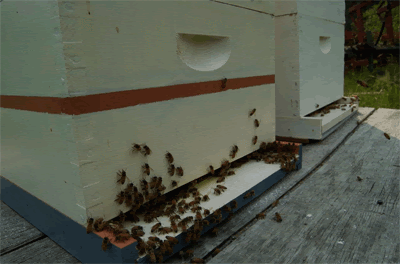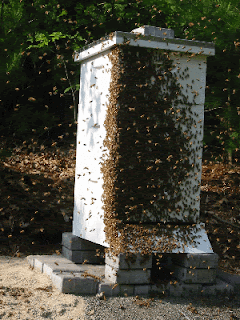Nothing like loosing your password to slow the posting. Then remembering it as if it were yesterday. Need to write it down somewhere.
So, update. All the bees are dead. No sugar coating the news. Mine died and so did Reese's in early feb. Reasons. Probably varoa mite or honey bound. So i took the hives in, cleaned mine out and so did Reese. Took the honey frames out and stored them securely.
What next?
In a few weeks we are getting our new packages of bees. So excited. I ordered 3 packages and am determined to make it work. Proper IPM for sure as well as judicious monitoring. I think we went slack for a bit last year. The new hives are ordered and should get here in time....they better. We will do a good job of documenting the installation and post that video up.
Stay tuned for more bee fun. Or fun watching Karsten getting stung. Either way, it'll be entertaining.
Saturday, March 15, 2008
Monday, January 7, 2008
Lost
Bee Hive died in Dover, MA
Ugh. I am so bummed. Went to check out the hive today especially since it was warmer, and go to find out it was dead. All the bees were dead. I was surprised though to see that there really werent that many bees in the hive. I took it apart, loaded it into the car and drove home. Still a little sad about the whole thing. Will go to Bee Club tonight and see what people say.
Then I tell Reese about it and he says that in SC his mom lost 3 of her 4 hives!
- K
Ugh. I am so bummed. Went to check out the hive today especially since it was warmer, and go to find out it was dead. All the bees were dead. I was surprised though to see that there really werent that many bees in the hive. I took it apart, loaded it into the car and drove home. Still a little sad about the whole thing. Will go to Bee Club tonight and see what people say.
Then I tell Reese about it and he says that in SC his mom lost 3 of her 4 hives!
- K
Wednesday, September 5, 2007
Bees invade Katy woman's home
here is a potentially painful problem at a home in Katy. Hundreds of thousands of bees were living inside the walls of a woman's house and no one could get rid of them until today. [more]
Thursday, August 2, 2007
HONEY!!!
What a few weeks difference makes. Early June I started seeing the honey supper being drawn out. Over the next few weeks they started filling it with honey. Long story short, we harvested 30lbs or about 3 gallons of honey!! I'll post the pictures soon. After harvesting the honey, I threw the honey super back on but pulled one frame out. The thinking is that the bees will pull the comb out past the frame and give me a little easier time uncapping it if they extrude it again
Thursday, June 7, 2007
Busy Bees

Wow, what a difference a few weeks make. About 2 weeks ago, I checked the hives, noted that they were growing at different rates. Mine seemed to be a little ahead of Reese's with lots of brood and the frames being drawn out. I made a mental note to order the new honey supers since you will need them earlier than you might think.

I get back from a trip, and go to check out the girls only to find them spilling out of the hive, large numbers of them in the entrance and all the frames in both boxes totally filled. Not just with comb but with brood, honey, pollen...jam packed. Then it got hot. Now I realized I should have ordered the honey supers and been ready. I hadn't and wasn't ready. What to do?
Panic was the #1 reaction. By all accounts, I was (and still maybe am) setting myself up for the hive to swarm. Too many bees, too little space, hot, and right at the time in mid Spring when the bees have a tendency to swarm....great. So, I started emailing and calling around. First call was to Tony L. from the club who said: "get a honey super on yesterday!" He also noted that hives will beard by congregating outside the hive to cool off. Great...new beekeeper and no clue. How could I have been so damned lazy to not order the honey supers?
Here is a picture of Ed K.'s hive bearding. Nowhere near what I have!

Next email was to Ed K. at the club too. Ed was SUPER helpful and went out of his way to help me out. He reiterated I needed to put the honey supers on even if it was raining and to not wait. He gave me an older hive box with new frames/foundation that I could use. Not only that, he drove up in the rain and delivered it to my door! THANK YOU!
So, the same day (3 days after seeing my bees do their thing), I popped the top and put an old box with new frames in. I didnt have a queen excluder at the time but more on that in a minute. Howard said that he would use the box with no hesitation since he knew where it came from and he was sure of no contamination. What Howard says, goes.
Drove up to Tyngsboro to get some supplies from Rick. Great guy. Bought 3 boxes, and 20 Pierco frames. All I need to do tonight is paint the boxes. here's the next step. I now have a honey super that is being worked on and hopefully the comb is being drawn out. On Saturday, i need to put the queen excluder and then frame by frame knock the honey super bees into the new supers to make sure the queen is NOT in the honey frames, otherwise, she'll go ahead and lay eggs. Then, I need to go in and really inspect the hive to make sure I dont have swarm cells or burr comb in the hive bodies. Then, i need to treat the bees with the sugar to start the IPM process and really keep the mites in check. Rick also suggested that I put a drone frame in to have drone brood and pull the frame 2 days prior to them hatching. That might be a little too ambitious....the rest, will happen on Saturday.
Tuesday, May 15, 2007
In Hive or Castle, Duty Without Power
By NATALIE ANGIER, NYT
Published: May 15, 2007
I never much cared for royalty, although I admit that, for reasons my family and I are still struggling to understand, I named my first cat “Princess Bubbles.”
[more]
Published: May 15, 2007
I never much cared for royalty, although I admit that, for reasons my family and I are still struggling to understand, I named my first cat “Princess Bubbles.”
[more]
Monday, May 14, 2007
Organic Beekeepers Seeing Fewer Cases of Colony Collapse
May 14, 2007
By Holly Case
Natural Food Network Newsletter Editor
The huge numbers of bees lost to the mysterious "colony collapse disorder" (CCD) continue to baffle scientists. However, some organic beekeepers say that they have not been experiencing the problem to the same degree that conventional beekeepers have.
According to anecdotal reports of members of a large email list for organic beekeepers, all beekeepers have been fighting a difficult battle against Varroa mites. Mites have been previously named as a possible cause of CCD; however, this problem is not entirely new. However, many conventional beekeepers are allegedly engaging in practices which may put their colonies at greater risk of collapse.
Many beekeepers have been using large quantities of pesticides to fumigate for the Varroa mites. When mites become established in a colony, they are often very difficult to eliminate before significant damage is done. Organic beekeepers are reportedly not experiencing as many problems with colony collapse, and they believe that the lack of pesticide use is the probable reason for the difference.
In addition, conventional beekeepers are more likely to transport their colonies across great distances to provide pollination services. As CCD becomes an even more widespread problem, beekeepers who offer pollination services for hire find themselves with more such work, which stresses their own colonies even further.
It is not conclusive that organic beekeepers' colonies are completely protected from CCD. Mites appear to be a substantial problem for all beekeepers, and it is unknown how significant the role of pesticide use is in colony collapse. Scientists are hoping to find the answer before it's too late.
By Holly Case
Natural Food Network Newsletter Editor
The huge numbers of bees lost to the mysterious "colony collapse disorder" (CCD) continue to baffle scientists. However, some organic beekeepers say that they have not been experiencing the problem to the same degree that conventional beekeepers have.
According to anecdotal reports of members of a large email list for organic beekeepers, all beekeepers have been fighting a difficult battle against Varroa mites. Mites have been previously named as a possible cause of CCD; however, this problem is not entirely new. However, many conventional beekeepers are allegedly engaging in practices which may put their colonies at greater risk of collapse.
Many beekeepers have been using large quantities of pesticides to fumigate for the Varroa mites. When mites become established in a colony, they are often very difficult to eliminate before significant damage is done. Organic beekeepers are reportedly not experiencing as many problems with colony collapse, and they believe that the lack of pesticide use is the probable reason for the difference.
In addition, conventional beekeepers are more likely to transport their colonies across great distances to provide pollination services. As CCD becomes an even more widespread problem, beekeepers who offer pollination services for hire find themselves with more such work, which stresses their own colonies even further.
It is not conclusive that organic beekeepers' colonies are completely protected from CCD. Mites appear to be a substantial problem for all beekeepers, and it is unknown how significant the role of pesticide use is in colony collapse. Scientists are hoping to find the answer before it's too late.
Subscribe to:
Posts (Atom)